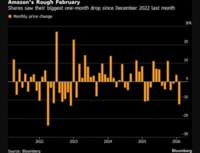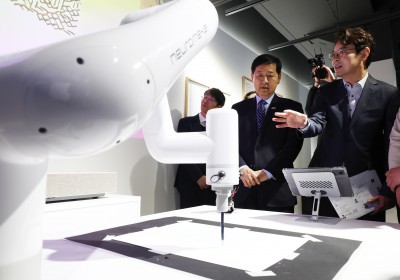Globalizing the Knowledge Economy
Remarks before the Houston World Affairs Council
Houston, Texas
April 13, 2007
When addressing an audience, it is customary for Federal Reserve officials to declare that they speak only for themselves and not for any other senior officials at the Fed, nor for any colleagues on the Federal Open Market Committee. That will be true today with one exception: I speak for everyone at the Federal Reserve in stating an admiration for the dynamism and spirit of this great city. Thank you for inviting me to this meeting of the Houston World Affairs Council.
I am going to talk to you today about globalization. This is a trendy word these days, and I have no doubt that I am not the first person to address the topic of globalization before this august group. I doubt I am even the 10th or the 20th speaker from whose lips you have heard that now ubiquitous word.
But today, I am going to do something so shocking and rare that you may actually gasp in amazement: I am going to quote a French politician. And I am going to quote him approvingly, with apologies in advance that by doing so I might damage his presidential campaign.
Last November, the Financial Times quoted Nicolas Sarkozy offering the French electorate a distinctly politically incorrect dose of reality. “Globalization is a fact,” Sarkozy said. “It would be as pointless to deny it or oppose it as to challenge the law of gravity or to stop the movement of the clouds. The question therefore is not whether globalization is good or bad. It is whether we are prepared for it.”
I could not agree more. While it may be cathartic or politically convenient to cast negative aspersions on globalization, it is a futile exercise. We have passed the point of no return in the intermingling of the world’s economies. It is now a given. Mr. Sarkozy asks the right question: Are we prepared for it?
The economic impact of globalization is the topic of the Dallas Fed’s 2006 annual report essay, titled “The Best of All Worlds,” which we are releasing to the public today—as soon as I finish this speech. You will be the first to have it. Please take it home and read the essay written by Michael Cox and Richard Alm, two of the Dallas Fed’s best and most eloquent minds.
The essay points out that the simultaneous opening up of the world economy—especially the integration of markets due to the telecommunications revolution and the development of cyberspace—has changed the way every entrepreneur, every manager, and every business woman and man in America contemplates their cost of goods sold and the markets they sell to as they navigate into the future.
The essay explores 10 ways globalization raises productivity and reduces costs. I am going to summarize them for you. But first, let me set the stage with a story about a good friend of mine named Dr. Jonathan Weissler, who holds the chair in pulmonary research named for my late, great father-in-law, Jim Collins, at the University of Texas Southwestern University Hospitals in Dallas, where Dr. Weissler is chief of medicine.
When Dr. Weissler sees a patient, he, like most doctors, dictates examination notes into a recorder so that the information can be transcribed into the patient’s file. Nothing startling there; this has been standard medical practice for decades. What is new—and a hallmark of what we call the Knowledge Economy—is that instead of paying an on-site employee at UT Southwestern to transcribe his dictation, he sends the recording electronically to a company that farms the work out to English speakers around the world to transcribe overnight. They type up the notes for a fraction of the cost while Dr. Weissler sleeps. And voilà, they are on the good doctor’s desktop the next morning.
Incidentally, Dr. Weissler says he can tell when the transcripts are produced in India because the English is perfect and even the most complex medical terms are spelled correctly—a testimony to the Indian ability to teach the blocking and tackling of proper English in their schools.
By reducing costs and streamlining his recordkeeping in this way, Weissler’s practice runs more efficiently and his staff can devote more time to serving patients. The real payoff is that the money saved can be reinvested into researching new ways to save and improve lives.
Dr. Weissler is more than prepared for globalization. Rather than cower before it, he is harnessing it. He is availing himself of resources created by the spread of knowledge around the world in order to save money and run an efficient operation. Therein lies an American-style answer to Monsieur Sarkozy’s pithy question.
To some this is alarming—especially those who focus on jobs lost to globalization, like the ones held by Texans and other Americans who once transcribed those notes for Dr. Weissler. Dwelling on these lost jobs or outsourced tasks ignores lessons of history. To be sure, we cannot and should not ignore the painful adjustments that economic advancement inflicts upon displaced workers; we should never underestimate the human costs of the process known to economists as creative destruction, a term coined by the iconic economist Joseph Schumpeter in 1942.
I grew up in a household where my father suffered more than his fair share of the destructive side of that process. It was difficult for him to grasp the allure of the “creative” side of the equation, and I am more familiar with the anguish that comes when a breadwinner loses his job than I would like to be. But I consider it a fool’s errand to seek to somehow stop the momentum of globalization, particularly when one considers that jobs lost to globalization pale in comparison to jobs lost to the steady march of technological progress. I rarely hear the speakers who cast invective upon “globalization” also decry the evils of new technologies and innovation.
It is the job of our political leaders to provide a bridging mechanism for people like my dear old dad—God rest his hardworking soul—that mitigates the destruction without hindering the creative side of Schumpeter’s phenomenon.
American entrepreneurs and workers have developed a mastery of creative destruction—albeit with fits and starts—over the past 200 years. Our $13 trillion economy—the world’s biggest, by far—is proof that we can adapt to new circumstances and profit from the benefits those circumstances provide. To be prepared for globalization—to harness it and ride it to continued prosperity—we must remain at the forefront of the Information Age. We must master the Knowledge Economy.
The lesson of the essay is that globalization is spreading the Knowledge Economy around the globe—and the Knowledge Economy is accelerating the pace of globalization. While globalization itself is not new, it has gathered intensity over the past decade or so because of technologies that make it cheaper and easier to move information to nearly all corners of the world.
We have had decades to contemplate globalization in goods—many of which come through the Port of Houston—that were produced by cheap labor and abundant resources in faraway lands like China. But globalization has spread beyond manufactured goods to other segments of the economy, rapidly moving up the value-added ladder. Computers, the Internet, high-capacity fiber-optic cables and other marvels of modern communications fuel the extension of international competition into a broad realm of the economy that had been largely isolated from it. I am referring, of course, to the globalization of the services sector.
Many services are still untouched by globalization. It remains impractical, for example, for a Houstonian to enjoy the pristine sushi freshly made by the dockside chefs who work around Tokyo’s Tsukiji fish market, or to import the services of a barber who lives in Seville—sorry, I couldn’t resist that one. But many more services from all parts of the world can be delivered here in the blink of an eye (or in 40 winks of Dr. Weissler's eye overnight), thanks to the revolution in communication technologies that allow knowledge to overcome traditional impediments of distance.
Dr. Weissler shows us how some of the medical profession’s common support services have been globalized. Yet, his example is but the tip of the iceberg of the ways we can stretch the boundaries of high-skilled services. In 2001, a surgeon in New York, using robotic tools, removed the gallbladder of a patient 3,870 miles away in the French city of Strasbourg. In 2005, a laptop computer in Boston guided instruments as they performed heart surgery—unaided by human hands—on a patient in Milan, Italy. Geographic boundaries and technological impediments are evaporating even at the far reaches of the value-added realm.
It is trends like these that inspired us at the Dallas Fed to unleash Michael Cox and Rick Alm and our other researchers to consider the ways globalization is changing our economy.
Here are the 10 ways in which globalization now impacts the Knowledge Economy. We have found that globalization lowers communication and transportation costs, point No. 1; fuels competition, point No. 2; and encourages specialization, point No. 3. A firm can now access labor, raw materials and other resources at any time and from anywhere on the globe, resulting in point No. 4: improved production functions.
Producers can sell their goods and services to a larger market, No. 5, and extend their economies of scale, No. 6, by producing to satisfy global, not just domestic, demand.
Point No. 7, capital markets expand, freeing money to seek the highest return available globally and to fund development of new production capacity anywhere on the planet.
Point 8, knowledge spreads across towns, industries and countries, fueled by migration, the Internet, cell phones and trade.
Globalization erodes national or natural monopoly power, making markets more accessible to competition and more fair to consumers—or in other words, more “contestable,” point 9. And finally, increased production leads to increased consumption without reducing the amount available for others to consume, point 10. Just because I’m downloading the most recent episode of 24 from iTunes does not mean someone in Norway cannot download it, too.
The common thread among these 10 factors is that they all raise productivity’s level or its growth rate—or both. Higher productivity lowers costs. Lower costs restrain inflation, the bête noire of any progressive economy and the bane of Federal Reserve officials and central bankers everywhere. In this fundamental way, globalization raises the economy’s speed limit, allowing policymakers to relax a little and let the economy expand at rates that might once have been considered unsustainable. In a globalized world, faster growth need not carry the same inflationary implications it does in a closed world.
The Fed’s mandate calls for keeping inflation low while maintaining maximum sustainable economic growth—a duty we cannot fulfill without weighing productivity. Getting more output from existing labor and capital allows the economy to grow faster without igniting price pressures. We saw this vividly, for example, in the 1990s, when the IT revolution led to surging productivity, lower costs and faster growth. The Fed understood that increased supplies of goods and services, not inflationary excess demand, fueled the expansion, and it wisely let the economy seek a higher growth rate.
Considering all the dynamics of our globalized world, one problem monetary policymakers have is that we find ourselves lacking proper measuring sticks to capture these intangible dynamics. When a Boston doctor operates remotely on a patient in Milan, should we credit it to the U.S. economy or the Italian economy? A Barbie doll is designed in America and assembled in Malaysia from Taiwanese plastic pellets, Chinese cloth and Japanese nylon. Is the doll American or Malaysian or something else? When people in the U.S. and other countries can work together so seamlessly, how can we pull them apart with the data? Our annual report underscores how the world is fast becoming one big integrated economy, which suggests we should care as much about foreign output gaps, capacity utilization rates and unemployment rates as we do about our own.
Traditional economic doctrine does not recognize the importance of foreign output to a country’s inflation rate. Only domestic output matters. But a new economic model, produced by the Dallas Fed, allows us to show that foreign output also matters. For central bankers, getting policy right will involve analyzing a great deal of additional data and overcoming blind spots about what’s going on in key parts of the world. We don’t, for example, know as much as we’d like about China’s capital stock, work hours and rural unemployment. We have no reliable estimates of the productive capacity in Brazil, India and Russia. All the data shortcomings are maddening, but they aren’t reason enough to deny the fundamental fact that globalization is changing the way our economies work.
Data that do not reflect the world in which we live increase the chances for errors in judgment. We need to develop much better measures for the global economy, particularly as services are increasingly traded. Today, our most detailed measures pertain to goods, a proportionally shrinking segment of our economy. We can tell you about agriculture and manufacturing in excruciating detail but have relatively little data about our fast-growing services sector—now 82 percent of U.S. employment. We have even less data on the global services economy.
Globalization doesn’t just drive down costs. It advances living standards in ways not captured by the standard economic measures of progress. We need new and better tools to help us determine just how globalization is affecting economies around the world, and how policymakers can reap benefits from these insights. Getting it right may well alter our notions of economic progress, with ramifications for how we approach the goal of price stability.
The Dallas Fed is hard at work researching this issue. We are in the process of establishing the Globalization and Monetary Policy Institute, and our economic research team—the same people who inform our Bank’s participation in the Federal Open Market Committee—is focused with laserlike intensity on advancing our knowledge of these underresearched and poorly understood phenomena.
I hope that our annual report will give you insight into how the operators of our economy—men and women like yourselves who keep our mighty economic machine humming—address the Sarkozy Challenge. Are we prepared for globalization? The answer is in your hands.
Thank you.
About the Author
Richard W. Fisher is president and CEO of the Federal Reserve Bank of Dallas.
Note
The views expressed by the author do not necessarily reflect official positions of the Federal Reserve System.
Remarks before the Houston World Affairs Council
Houston, Texas
April 13, 2007
When addressing an audience, it is customary for Federal Reserve officials to declare that they speak only for themselves and not for any other senior officials at the Fed, nor for any colleagues on the Federal Open Market Committee. That will be true today with one exception: I speak for everyone at the Federal Reserve in stating an admiration for the dynamism and spirit of this great city. Thank you for inviting me to this meeting of the Houston World Affairs Council.
I am going to talk to you today about globalization. This is a trendy word these days, and I have no doubt that I am not the first person to address the topic of globalization before this august group. I doubt I am even the 10th or the 20th speaker from whose lips you have heard that now ubiquitous word.
But today, I am going to do something so shocking and rare that you may actually gasp in amazement: I am going to quote a French politician. And I am going to quote him approvingly, with apologies in advance that by doing so I might damage his presidential campaign.
Last November, the Financial Times quoted Nicolas Sarkozy offering the French electorate a distinctly politically incorrect dose of reality. “Globalization is a fact,” Sarkozy said. “It would be as pointless to deny it or oppose it as to challenge the law of gravity or to stop the movement of the clouds. The question therefore is not whether globalization is good or bad. It is whether we are prepared for it.”
I could not agree more. While it may be cathartic or politically convenient to cast negative aspersions on globalization, it is a futile exercise. We have passed the point of no return in the intermingling of the world’s economies. It is now a given. Mr. Sarkozy asks the right question: Are we prepared for it?
The economic impact of globalization is the topic of the Dallas Fed’s 2006 annual report essay, titled “The Best of All Worlds,” which we are releasing to the public today—as soon as I finish this speech. You will be the first to have it. Please take it home and read the essay written by Michael Cox and Richard Alm, two of the Dallas Fed’s best and most eloquent minds.
The essay points out that the simultaneous opening up of the world economy—especially the integration of markets due to the telecommunications revolution and the development of cyberspace—has changed the way every entrepreneur, every manager, and every business woman and man in America contemplates their cost of goods sold and the markets they sell to as they navigate into the future.
The essay explores 10 ways globalization raises productivity and reduces costs. I am going to summarize them for you. But first, let me set the stage with a story about a good friend of mine named Dr. Jonathan Weissler, who holds the chair in pulmonary research named for my late, great father-in-law, Jim Collins, at the University of Texas Southwestern University Hospitals in Dallas, where Dr. Weissler is chief of medicine.
When Dr. Weissler sees a patient, he, like most doctors, dictates examination notes into a recorder so that the information can be transcribed into the patient’s file. Nothing startling there; this has been standard medical practice for decades. What is new—and a hallmark of what we call the Knowledge Economy—is that instead of paying an on-site employee at UT Southwestern to transcribe his dictation, he sends the recording electronically to a company that farms the work out to English speakers around the world to transcribe overnight. They type up the notes for a fraction of the cost while Dr. Weissler sleeps. And voilà, they are on the good doctor’s desktop the next morning.
Incidentally, Dr. Weissler says he can tell when the transcripts are produced in India because the English is perfect and even the most complex medical terms are spelled correctly—a testimony to the Indian ability to teach the blocking and tackling of proper English in their schools.
By reducing costs and streamlining his recordkeeping in this way, Weissler’s practice runs more efficiently and his staff can devote more time to serving patients. The real payoff is that the money saved can be reinvested into researching new ways to save and improve lives.
Dr. Weissler is more than prepared for globalization. Rather than cower before it, he is harnessing it. He is availing himself of resources created by the spread of knowledge around the world in order to save money and run an efficient operation. Therein lies an American-style answer to Monsieur Sarkozy’s pithy question.
To some this is alarming—especially those who focus on jobs lost to globalization, like the ones held by Texans and other Americans who once transcribed those notes for Dr. Weissler. Dwelling on these lost jobs or outsourced tasks ignores lessons of history. To be sure, we cannot and should not ignore the painful adjustments that economic advancement inflicts upon displaced workers; we should never underestimate the human costs of the process known to economists as creative destruction, a term coined by the iconic economist Joseph Schumpeter in 1942.
I grew up in a household where my father suffered more than his fair share of the destructive side of that process. It was difficult for him to grasp the allure of the “creative” side of the equation, and I am more familiar with the anguish that comes when a breadwinner loses his job than I would like to be. But I consider it a fool’s errand to seek to somehow stop the momentum of globalization, particularly when one considers that jobs lost to globalization pale in comparison to jobs lost to the steady march of technological progress. I rarely hear the speakers who cast invective upon “globalization” also decry the evils of new technologies and innovation.
It is the job of our political leaders to provide a bridging mechanism for people like my dear old dad—God rest his hardworking soul—that mitigates the destruction without hindering the creative side of Schumpeter’s phenomenon.
American entrepreneurs and workers have developed a mastery of creative destruction—albeit with fits and starts—over the past 200 years. Our $13 trillion economy—the world’s biggest, by far—is proof that we can adapt to new circumstances and profit from the benefits those circumstances provide. To be prepared for globalization—to harness it and ride it to continued prosperity—we must remain at the forefront of the Information Age. We must master the Knowledge Economy.
The lesson of the essay is that globalization is spreading the Knowledge Economy around the globe—and the Knowledge Economy is accelerating the pace of globalization. While globalization itself is not new, it has gathered intensity over the past decade or so because of technologies that make it cheaper and easier to move information to nearly all corners of the world.
We have had decades to contemplate globalization in goods—many of which come through the Port of Houston—that were produced by cheap labor and abundant resources in faraway lands like China. But globalization has spread beyond manufactured goods to other segments of the economy, rapidly moving up the value-added ladder. Computers, the Internet, high-capacity fiber-optic cables and other marvels of modern communications fuel the extension of international competition into a broad realm of the economy that had been largely isolated from it. I am referring, of course, to the globalization of the services sector.
Many services are still untouched by globalization. It remains impractical, for example, for a Houstonian to enjoy the pristine sushi freshly made by the dockside chefs who work around Tokyo’s Tsukiji fish market, or to import the services of a barber who lives in Seville—sorry, I couldn’t resist that one. But many more services from all parts of the world can be delivered here in the blink of an eye (or in 40 winks of Dr. Weissler's eye overnight), thanks to the revolution in communication technologies that allow knowledge to overcome traditional impediments of distance.
Dr. Weissler shows us how some of the medical profession’s common support services have been globalized. Yet, his example is but the tip of the iceberg of the ways we can stretch the boundaries of high-skilled services. In 2001, a surgeon in New York, using robotic tools, removed the gallbladder of a patient 3,870 miles away in the French city of Strasbourg. In 2005, a laptop computer in Boston guided instruments as they performed heart surgery—unaided by human hands—on a patient in Milan, Italy. Geographic boundaries and technological impediments are evaporating even at the far reaches of the value-added realm.
It is trends like these that inspired us at the Dallas Fed to unleash Michael Cox and Rick Alm and our other researchers to consider the ways globalization is changing our economy.
Here are the 10 ways in which globalization now impacts the Knowledge Economy. We have found that globalization lowers communication and transportation costs, point No. 1; fuels competition, point No. 2; and encourages specialization, point No. 3. A firm can now access labor, raw materials and other resources at any time and from anywhere on the globe, resulting in point No. 4: improved production functions.
Producers can sell their goods and services to a larger market, No. 5, and extend their economies of scale, No. 6, by producing to satisfy global, not just domestic, demand.
Point No. 7, capital markets expand, freeing money to seek the highest return available globally and to fund development of new production capacity anywhere on the planet.
Point 8, knowledge spreads across towns, industries and countries, fueled by migration, the Internet, cell phones and trade.
Globalization erodes national or natural monopoly power, making markets more accessible to competition and more fair to consumers—or in other words, more “contestable,” point 9. And finally, increased production leads to increased consumption without reducing the amount available for others to consume, point 10. Just because I’m downloading the most recent episode of 24 from iTunes does not mean someone in Norway cannot download it, too.
The common thread among these 10 factors is that they all raise productivity’s level or its growth rate—or both. Higher productivity lowers costs. Lower costs restrain inflation, the bête noire of any progressive economy and the bane of Federal Reserve officials and central bankers everywhere. In this fundamental way, globalization raises the economy’s speed limit, allowing policymakers to relax a little and let the economy expand at rates that might once have been considered unsustainable. In a globalized world, faster growth need not carry the same inflationary implications it does in a closed world.
The Fed’s mandate calls for keeping inflation low while maintaining maximum sustainable economic growth—a duty we cannot fulfill without weighing productivity. Getting more output from existing labor and capital allows the economy to grow faster without igniting price pressures. We saw this vividly, for example, in the 1990s, when the IT revolution led to surging productivity, lower costs and faster growth. The Fed understood that increased supplies of goods and services, not inflationary excess demand, fueled the expansion, and it wisely let the economy seek a higher growth rate.
Considering all the dynamics of our globalized world, one problem monetary policymakers have is that we find ourselves lacking proper measuring sticks to capture these intangible dynamics. When a Boston doctor operates remotely on a patient in Milan, should we credit it to the U.S. economy or the Italian economy? A Barbie doll is designed in America and assembled in Malaysia from Taiwanese plastic pellets, Chinese cloth and Japanese nylon. Is the doll American or Malaysian or something else? When people in the U.S. and other countries can work together so seamlessly, how can we pull them apart with the data? Our annual report underscores how the world is fast becoming one big integrated economy, which suggests we should care as much about foreign output gaps, capacity utilization rates and unemployment rates as we do about our own.
Traditional economic doctrine does not recognize the importance of foreign output to a country’s inflation rate. Only domestic output matters. But a new economic model, produced by the Dallas Fed, allows us to show that foreign output also matters. For central bankers, getting policy right will involve analyzing a great deal of additional data and overcoming blind spots about what’s going on in key parts of the world. We don’t, for example, know as much as we’d like about China’s capital stock, work hours and rural unemployment. We have no reliable estimates of the productive capacity in Brazil, India and Russia. All the data shortcomings are maddening, but they aren’t reason enough to deny the fundamental fact that globalization is changing the way our economies work.
Data that do not reflect the world in which we live increase the chances for errors in judgment. We need to develop much better measures for the global economy, particularly as services are increasingly traded. Today, our most detailed measures pertain to goods, a proportionally shrinking segment of our economy. We can tell you about agriculture and manufacturing in excruciating detail but have relatively little data about our fast-growing services sector—now 82 percent of U.S. employment. We have even less data on the global services economy.
Globalization doesn’t just drive down costs. It advances living standards in ways not captured by the standard economic measures of progress. We need new and better tools to help us determine just how globalization is affecting economies around the world, and how policymakers can reap benefits from these insights. Getting it right may well alter our notions of economic progress, with ramifications for how we approach the goal of price stability.
The Dallas Fed is hard at work researching this issue. We are in the process of establishing the Globalization and Monetary Policy Institute, and our economic research team—the same people who inform our Bank’s participation in the Federal Open Market Committee—is focused with laserlike intensity on advancing our knowledge of these underresearched and poorly understood phenomena.
I hope that our annual report will give you insight into how the operators of our economy—men and women like yourselves who keep our mighty economic machine humming—address the Sarkozy Challenge. Are we prepared for globalization? The answer is in your hands.
Thank you.
About the Author
Richard W. Fisher is president and CEO of the Federal Reserve Bank of Dallas.
Note
The views expressed by the author do not necessarily reflect official positions of the Federal Reserve System.























